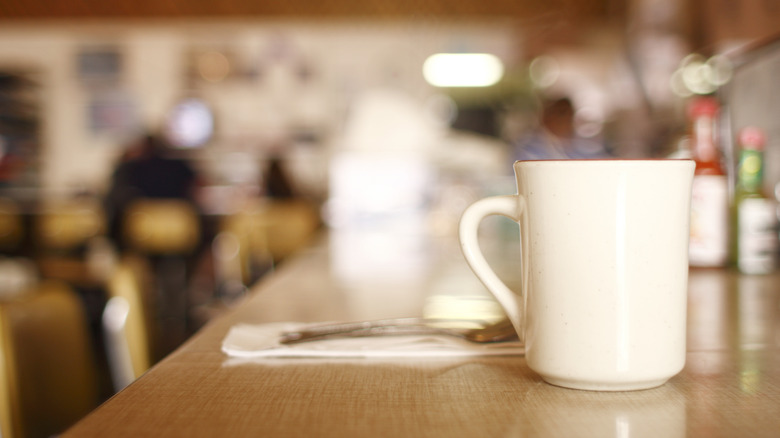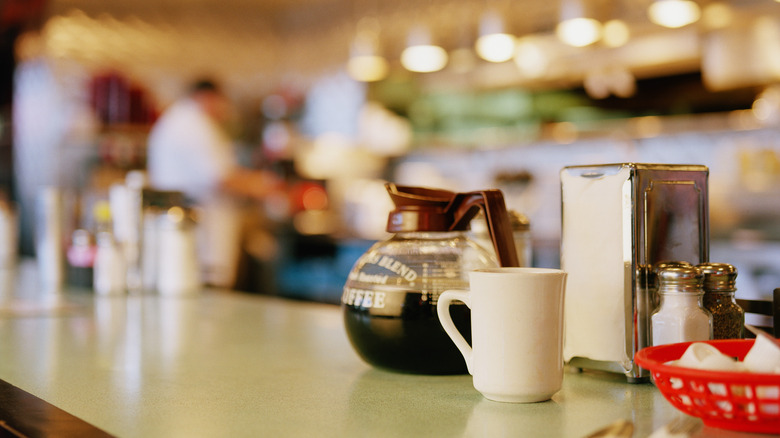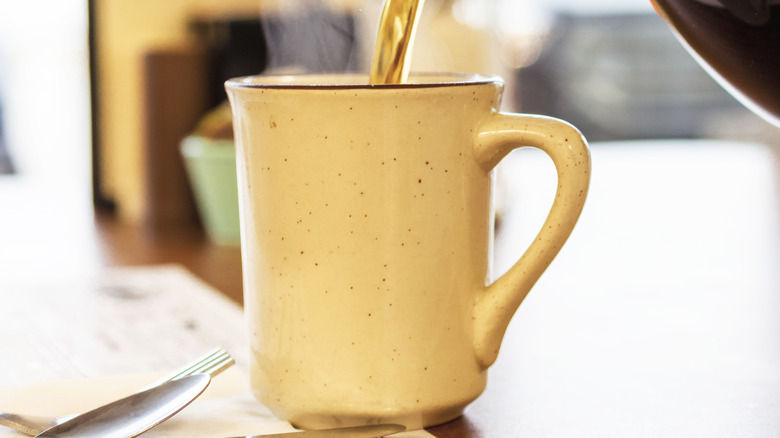Why Diner Coffee Tastes Different From Your Home Brew
There's something about sitting in a diner and ordering a warm cup of coffee that sparks feelings of something — maybe not quite joy, but definitely something positive. Coffee has powers that can make us all feel a bit like we're on an episode of a '90s sitcom. Sitting in the booth of a diner with a cup of cheap, warm joe brings us all a bit of comfort. The flavor of diner coffee isn't widely considered good per se, but it's certainly not anything that can be replicated at home.
The taste of coffee varies widely depending on several factors, like the type of beans used and the roasting and brewing methods. Diner coffee is no different. Diners frequently stay open all hours of the day with coffee readily available morning, noon, and night. Room-temperature coffee can only be left out for twelve hours before the risk of bacteria sets in, but diners serve coffee hot, and depending on when you order it, it may have been sitting on a warmer for a long time, which changes its flavor. It's also possible that your favorite diner uses beans that are different from those you'd typically brew with at home.
The longer coffee sits on a burner, the more bitter it tastes
Like most food or beverages, the longer coffee is left to sit, the more the taste changes. So when you order coffee from a diner, you may be sacrificing flavor in favor of that always-ready warm cup of coffee. The coffee grounds themselves are filled with various oils, acids, and molecules that are known as coffee solubles. These coffee solubles are responsible for the drink's flavor. If the process of making a cup of coffee isn't consistent from start to finish, all the way down to the water used to brew, the flavor could be different each time.
The best coffee brewing temperature to perfectly dissolve these coffee solubles for an enjoyable flavor profile is about 195 to 205 degrees Fahrenheit. On the other hand, higher temperatures cause the oils in coffee solubles to oxidize faster and the acids to degrade. This means that when it isn't consumed in a timely manner, the lengthy exposure to high temperatures can lead to a bitter, burnt, or ... unique-tasting coffee that's difficult to enjoy.
Since keeping coffee piping hot and always ready to serve is part of the appeal for diners, high temperatures may be maintained for long periods. Depending on when you order your coffee, it may be poured into your mug from a brand-new pot with a pleasant, fresh taste, or a pot that's been sitting for quite some time, resulting in that slightly sour flavor.
The type of coffee bean affects the flavor
To many, the complexities of coffee are an art form to be mastered. To those who don't share that passion or are unfamiliar with the ins and outs of the coffee-making process, it may come as a surprise that not all coffees are created equal. The draw to diner coffee is the seemingly impossible-to-achieve-elsewhere flavor. When it comes to flavor, many think of coffee beans, and there are two types that are typically used for brewing the coffee we drink regularly: Arabica and Robusta. A few popular dining establishments like Denny's and Waffle House use Arabica beans in their coffee.
The beans that are used to brew a mug of hot bean water are arguably one of the most important factors. Arabica beans have a lower caffeine content and create a smoother taste than Robusta coffee beans. The taste of Robusta coffee is more bitter, and with a higher caffeine content, it's sure to wake you up. So, if your diner coffee has that signature bitter flavor, it may be using a Robusta blend. Either way, the familiar taste that you can only hope to drown out with copious numbers of sugar packets seems to be the magic of a classic American diner.


